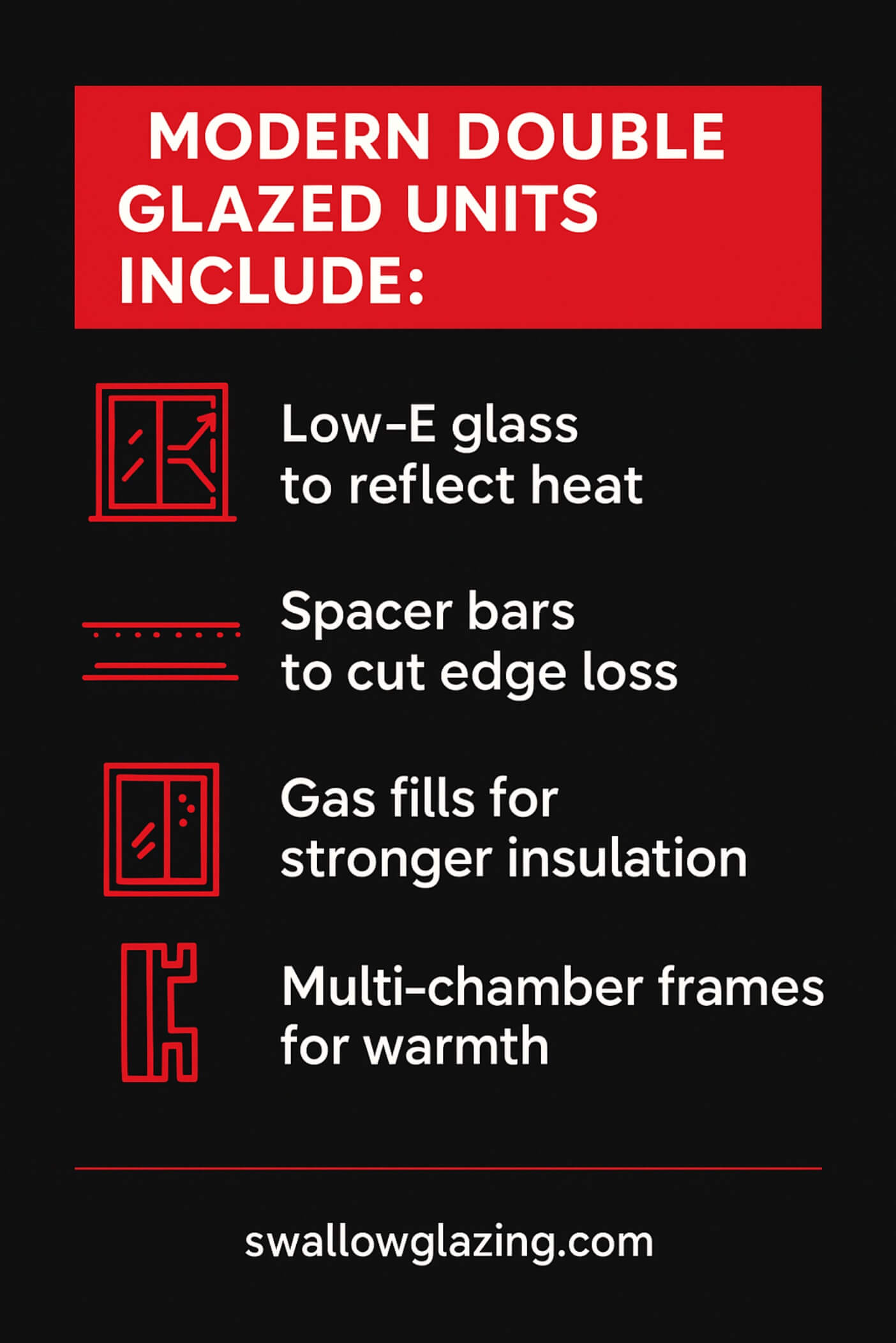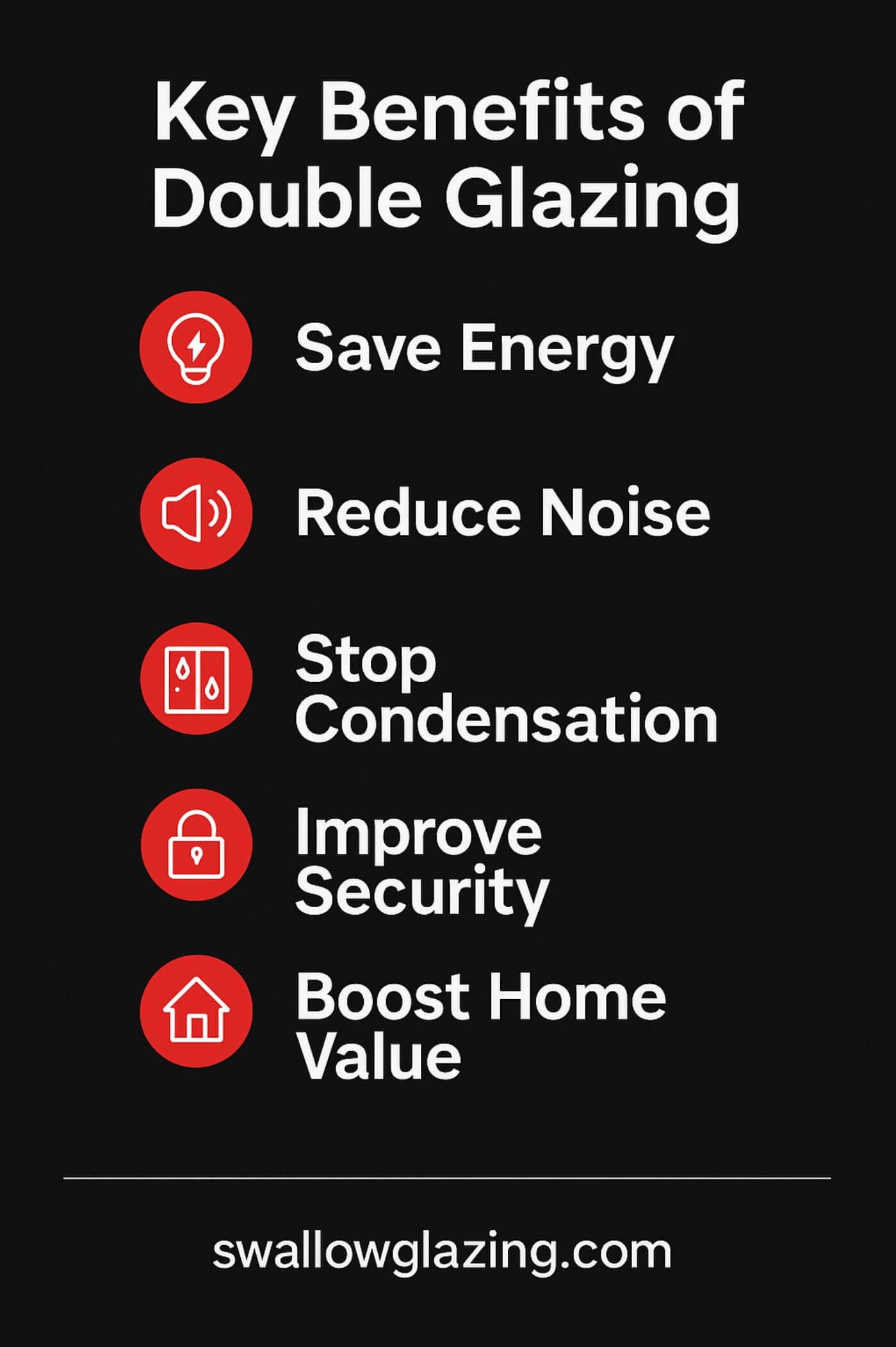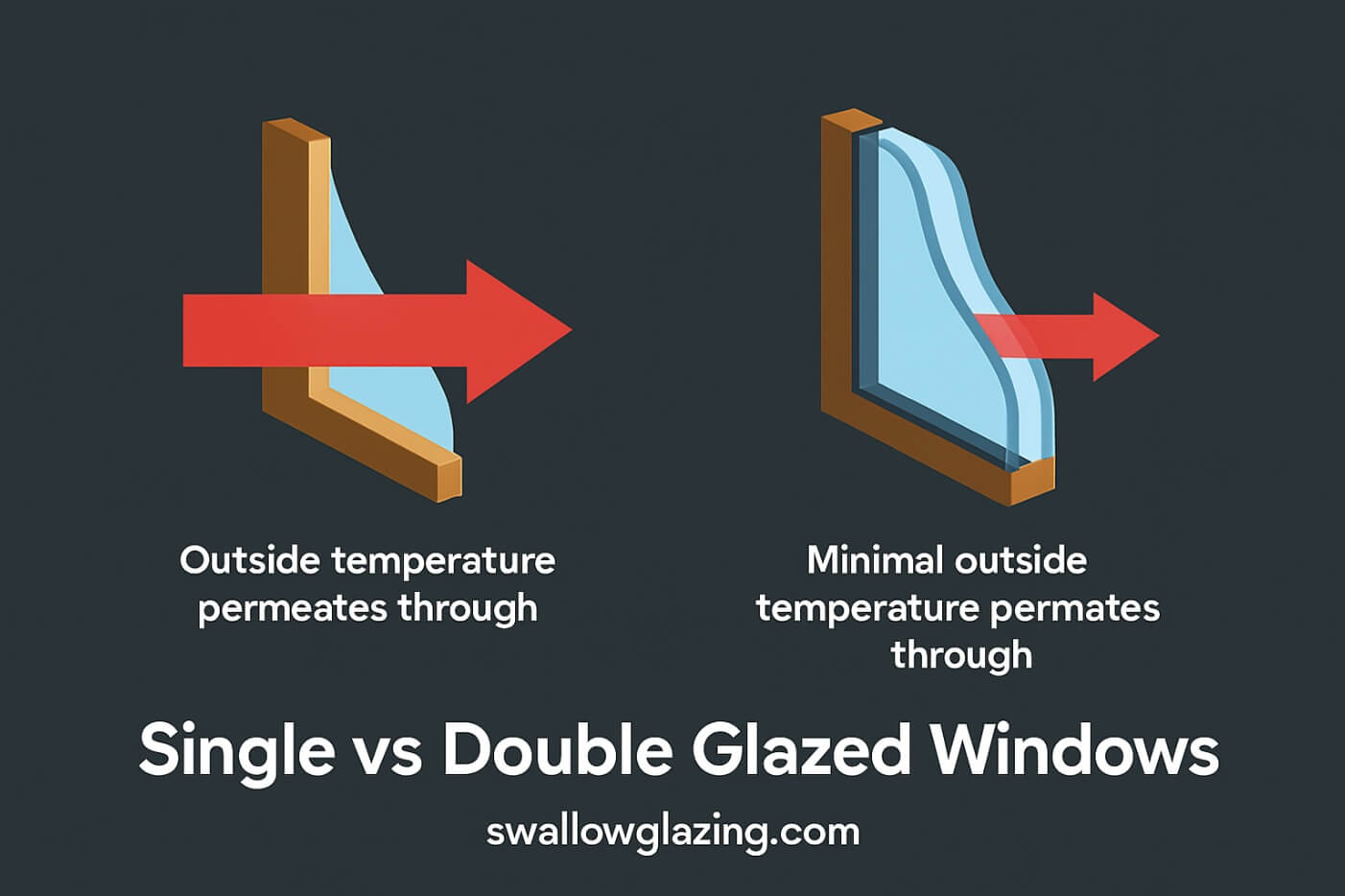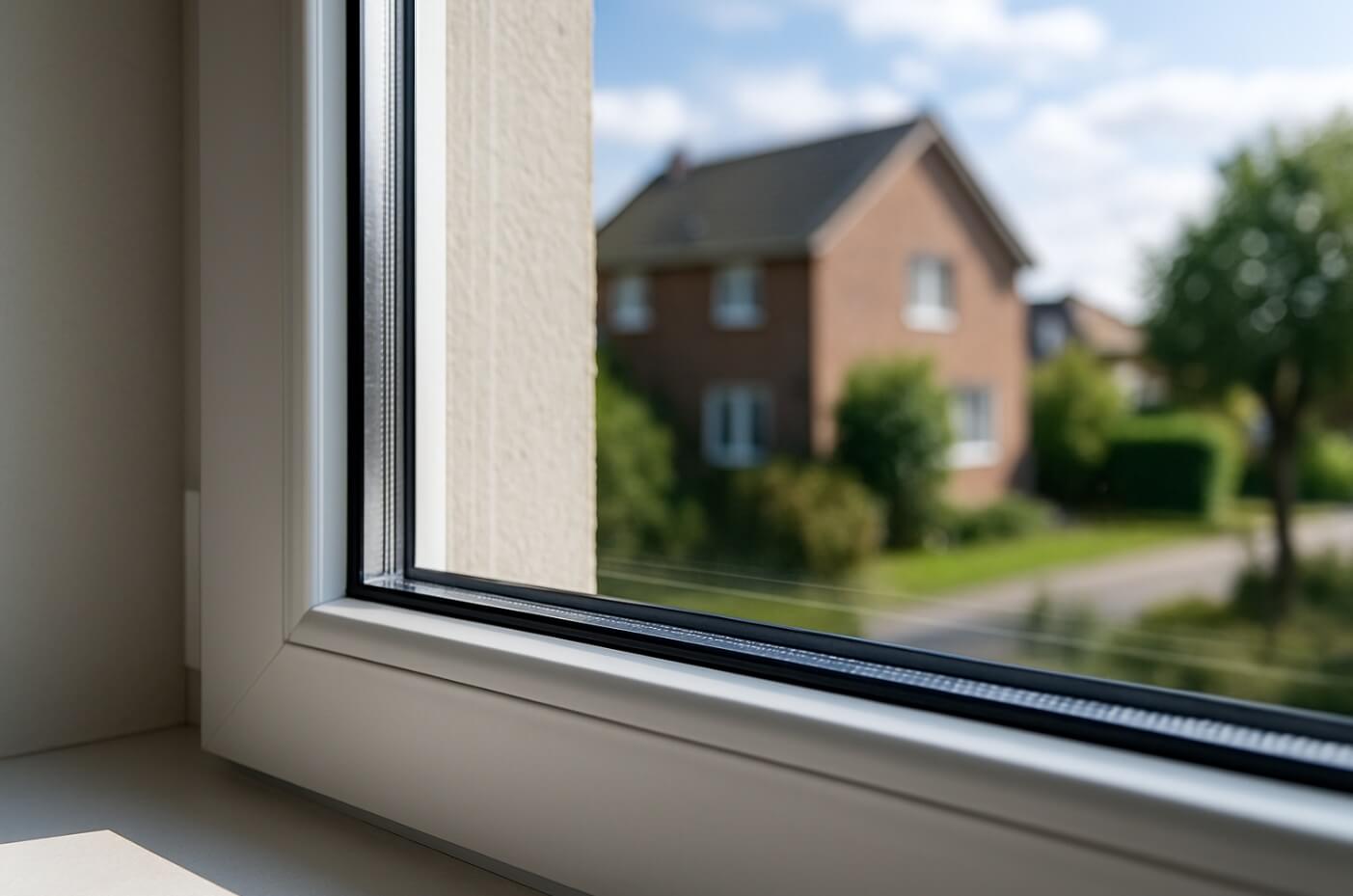Double glazing consists of two glass panes with a sealed air/gas gap between them. This design creates thermal insulation, reduces noise, prevents heat loss, and lowers energy bills by minimising heat transfer between your home and the outside environment.
Double glazing represents one of the most significant home improvements for energy efficiency and comfort. These specialised window units feature two panes of glass with a sealed gap between them, creating an insulating barrier that transforms how your home retains heat, blocks noise, and reduces energy costs.
Key Takeaways
- Double glazing creates an insulating barrier with two glass panes and a sealed gas-filled gap, reducing heating costs by 15-25% and increasing energy efficiency.
- Beyond energy savings, double-glazed windows significantly reduce outside noise by 25-30 decibels, minimise condensation, and enhance home security.
- Quality double glazing typically lasts 20-25 years and can increase property value by 5-10%, making it a worthwhile long-term investment for homeowners.
What Is Double Glazing?
Double glazing consists of two glass panes separated by a sealed gap filled with air or an inert gas like argon. This entire assembly, known as an Insulating Glass Unit (IGU), fits within a frame made from materials such as uPVC, aluminium, or timber.
The double glazed window pane structure creates a thermal barrier that dramatically reduces heat transfer between your home and the outdoors. Unlike single glazing, this dual-pane system prevents the rapid heat exchange that leads to energy waste.
Recent statistics show that double glazing has become mainstream in UK housing, with 88% of English homes now featuring full double glazing, a substantial increase from 79% in 2012.

How Does Double Glazing Work?
Double glazing works by creating an insulating barrier that slows down heat transfer through your windows. This insulation works through three main physical principles:
- Reduced conduction: The sealed air or gas layer has poor thermal conductivity. Think of it like a thermos flask that keeps hot drinks hot and cold drinks cold by limiting heat movement through its walls.
- Limited convection: The narrow gap between panes restricts air circulation, preventing heat from being carried away through convection currents that would typically form in larger spaces.
- Minimised radiation: Many modern units include low-emissivity (low-E) glass with an invisible metal oxide coating. This clever coating reflects heat back toward its source while still allowing light through. In winter, it bounces indoor heat back into your room rather than letting it escape outside.
The effectiveness of double glazing is measured using U-values. Lower U-values indicate better insulation performance. UK building regulations now require replacement windows to achieve a maximum U-value of 1.4 W/m²K, while new buildings must meet 1.6 W/m²K or better.
Does Double Glazing Keep Heat Out?
Double glazing works as a year-round climate control solution for your home:
- Winter benefits: The insulating barrier keeps valuable heat inside your home, reducing the strain on your heating system and keeping rooms warmer for longer.
- Summer advantages: The same technology works in reverse during hot weather, preventing external heat from entering your home and helping maintain cooler indoor temperatures.
This consistent thermal barrier means your home stays more comfortable throughout changing seasons without excessive energy use. The stable indoor temperature creates a more pleasant living environment while reducing your carbon footprint through lower energy consumption.
When to Consider Professional Window Repair or Replacement
Sometimes DIY maintenance is not enough. Professional repair or replacement may be required to maintain security, smooth operation, and energy efficiency. The following situations indicate it is time to call a professional:
- Frames are cracked, warped or damaged: Structural issues affect lock performance and overall window integrity.
- Locks continue to malfunction: Persistent problems may indicate worn or broken mechanisms that require expert attention.
- Full replacement is required: Replacing locks or windows ensures smooth operation, energy efficiency, and home security.
| Season | How Double Glazing Helps | Benefit to You |
|---|---|---|
| Winter | Traps heat inside | Lower heating bills, warmer rooms |
| Summer | Blocks external heat | Cooler indoor temperatures, reduced need for cooling |
| Year-round | Stabilises indoor temperature | Consistent comfort, reduced energy costs |
| All weather | Minimises drafts and cold spots | More comfortable living spaces |
How Are Double Glazed Windows Made?
The manufacturing process for double-glazed units involves precision engineering to ensure performance and longevity.
- First, glass sheets are cut to exact dimensions before undergoing any required treatments such as toughening or application of low-E coatings.
- Next, a hollow aluminium or composite spacer bar containing moisture-absorbing desiccant is applied around the perimeter of one glass pane.
- When using argon or other inert gases, the assembly happens in a controlled environment where air is extracted and replaced with the insulating gas.
- The second pane is positioned on top and the entire perimeter sealed with primary and secondary sealants to create a completely airtight unit.
- This sealed glass unit is then fitted into the chosen frame material, creating a complete window ready for installation.
Each unit undergoes rigorous testing for airtightness and seal integrity before leaving the factory.
Key Benefits of Double Glazing
Upgrading to double glazed windows delivers multiple advantages for homeowners:

Energy Efficiency and Cost Savings
Double glazing typically reduces heating costs by 15-25% compared to single glazing. For an average UK home, this can represent significant annual savings that accumulate over the windows’ lifetime.
Energy efficiency improvements also contribute to higher Energy Performance Certificate (EPC) ratings. Government data shows 48% of UK dwellings now achieve EPC ratings of A-C, up from just 19% in 2012, with double glazing playing a key role in this improvement.
Noise Reduction
Standard double glazing reduces external noise by approximately 25-30 decibels. This makes a substantial difference for homes near busy roads, flight paths, or urban centres.
For properties in particularly noisy locations, acoustic glass options with different pane thicknesses or laminated construction can provide even greater sound reduction, with laboratory tests showing performance of 31-40 dB Rw depending on the specific configuration.
Condensation Control
Double glazing significantly reduces condensation by maintaining warmer inner glass surface temperatures. This helps prevent the mould and mildew problems associated with excess moisture, protecting both your home and your health.
Enhanced Security
The dual-pane construction makes double-glazed windows inherently more difficult to break than single glazing. When combined with modern locking systems in quality UPVC doors and windows, this provides substantially improved security for your home.
Increased Property Value
Quality double glazing can boost your property value by 5-10% according to real estate experts. Prospective buyers recognise the benefits and often prioritise homes with energy-efficient windows and doors when house hunting.
Double Glazing vs. Single Glazing

The performance differences between double and single glazing become clear when comparing key metrics:
| Feature | Single Glazing | Double Glazing | Real-World Impact |
|---|---|---|---|
| Thermal Insulation | Very poor (U-value 4.8-5.8) | Good to excellent (U-value 1.4-3.0) | Warmer home, lower bills |
| Noise Reduction | Minimal | Significant (25-30dB) | Quieter, more peaceful living spaces |
| Condensation | Frequent problem | Largely eliminated | Healthier home environment |
| Security | Easily broken | More break-resistant | Improved home security |
| Energy Bills | Higher | Lower (15-25% reduction) | Long-term cost savings |
While the initial investment in double glazing is higher, the combined benefits of energy savings, improved comfort, noise reduction, and enhanced security make it worthwhile for most homeowners.
Our double glazing services provide these benefits through quality products installed to the highest standards.
Conclusion
Double glazing transforms homes with better insulation, noise reduction, and security. Its two-pane design with a sealed air or gas gap creates an effective thermal barrier that saves energy year-round. For quality double glazing in Uxbridge that enhances both comfort and property value, our experienced team is ready to help. Contact us today for a free, no-obligation quote and take the first step toward a warmer, quieter, more energy-efficient home.
FAQ
What is double glazing made of?
Double glazing consists of two glass panes (typically 4-6mm thick) separated by a spacer bar and sealed cavity filled with air or inert gas. The unit mounts in a frame made from uPVC, aluminium, or timber. Modern units often include low-E coatings on one glass surface to reflect heat back into the room.
How does double glazing reduce heat loss?
Double glazing reduces heat loss through three mechanisms: the trapped air/gas layer provides insulation with low thermal conductivity, the sealed design prevents convection currents, and low-E coatings reflect radiant heat back into the room rather than allowing it to escape through the window.
Does double glazing help with noise?
Yes, standard double glazing typically reduces external noise by 25-30 decibels. The dual panes with sealed air gap dampen sound waves, providing significant noise reduction compared to single glazing. For enhanced acoustic performance, units with different glass thicknesses or laminated glass provide even greater sound insulation.
How long does double glazing last?
Quality double glazing typically lasts 20-25 years or more. The actual lifespan depends on installation quality, frame materials, and environmental conditions. Most manufacturers offer guarantees of 10-15 years on frames and 5-10 years on sealed glass units against internal condensation or seal failure.
Is double glazing worth the cost?
Double glazing represents a worthwhile investment for most homeowners. The upfront cost is offset by energy savings, increased property value, improved comfort, noise reduction, and enhanced security. For an average UK home, double glazing typically pays for itself within 10-15 years through energy savings alone.


